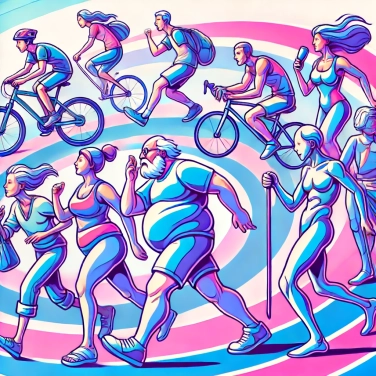We gain weight as we age due to a decrease in basal metabolism and loss of muscle mass, which often leads to an increase in body fat.

As you age, your body naturally burns fewer calories even at rest: this is called the basal metabolism. This phenomenon begins in your thirties and progressively intensifies thereafter. Specifically, after this age, each passing decade generally causes your metabolism to decrease by about 2 to 3%. Thus, with the same diet, your body more easily stores what you eat as body fat, which explains why you might gain weight as you get older without changing your eating habits. In simple terms, you expend less, so you store more.
As the years go by, your hormonal balance changes quite a bit — less growth hormone, a decrease in testosterone in men, and a drop in estrogen during menopause in women. All of this encourages fat gain, especially around the belly. Thyroid hormones, which play a role in your metabolism, may also decrease slightly, making your body less efficient at burning calories. In short, it's a real hormonal cocktail that makes your body more likely to store fat and harder to lose it than before.
As we age, we naturally move less than before: we tend to become more sedentary. Office work, driving, retirement, and a relaxed routine gradually reduce our daily opportunities to be active. However, less regular movement also means fewer calories burned. We easily find ourselves storing a bit too much energy, which gradually turns into fat. This gradual decrease in activity plays a significant role in weight gain over the years.
As we age, our muscles naturally tend to gradually shrink. This phenomenon is called sarcopenia, a complicated term that simply means that after our thirties, we progressively lose muscle mass. This muscle loss reduces our energy expenditure at rest, and the less muscle we have, the fewer calories we burn naturally. The result is that the body more easily accumulates fat. Additionally, fewer muscles weaken our ability to stay active for long periods or to practice certain sports effectively. This vicious circle pushes us to move less, which promotes long-term weight gain.
Over the years, we develop bad habits without necessarily realizing it: snacking in front of the TV, eating more at restaurants, or treating ourselves more often to foods that are very high in sugars or fats. These small deviations eventually weigh heavily on the scale. In addition, our lifestyle changes; we move less, spend more time sitting, and have fewer outdoor activities. The result? We eat the same amount, or even more, but we burn significantly less energy. This combination gradually leads to sustainable weight gain, especially around the waist. Irregular or insufficient sleep habits also promote fat storage by affecting hormones responsible for appetite and satiety, and this doesn’t help maintain one’s figure.
The decrease in sex hormones, such as estrogen in women and testosterone in men over the years, often results in an increased accumulation of fat, particularly localized in the abdominal area.
With age, the sensation of thirst tends to diminish, often leading to insufficient hydration. However, drinking enough water promotes the feeling of fullness and can help you maintain an optimal weight.
Studies indicate that regular and repeated sleep deprivation can disrupt appetite hormones — notably by increasing ghrelin (the hunger hormone) and decreasing leptin (the satiety hormone) — leading to significant weight gain in the long term.
Chronic stress increases cortisol, also known as the stress hormone, which promotes fat storage—particularly around the waist. Managing stress through relaxing activities can therefore play an important role in weight control as we age.
Absolutely, chronic stress contributes to an increase in cortisol, a hormone that promotes fat storage, particularly in the abdominal area. Effectively managing stress through relaxation techniques or regular physical activities is essential to prevent age-related weight gain.
Yes, prioritizing fiber-rich foods, fresh fruits and vegetables, lean proteins, and low-calorie density foods can help manage weight. A balanced diet helps prevent the caloric excess that often accompanies age-related metabolic changes.
No, women generally experience more significant weight gain at the time of menopause due to substantial hormonal changes such as the decrease in estrogen, while men tend to experience a slow and gradual weight gain often associated with a decline in testosterone as they age.
Regular physical activity, particularly strength training or adapted weightlifting, effectively helps to preserve or increase muscle mass, thereby slowing down age-related loss known as sarcopenia.
No, although aging naturally leads to various hormonal and metabolic changes that promote weight gain, adopting a balanced diet and maintaining an active lifestyle can significantly prevent or limit this weight gain.
Basal metabolism generally begins to slow down slightly after the age of 30, and this decrease gradually intensifies after the age of 40. This natural slowdown makes it easier to gain weight if eating habits or physical activity do not adapt over time.

No one has answered this quiz yet, be the first!' :-)
Question 1/5